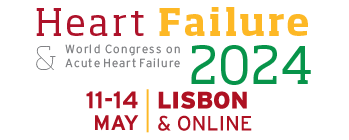ESC Florence Nightingale Lecture in Nurse-Led Research: Prof. Anna Strömberg
Nurse-led heart failure clinics – slow implementation despite strong evidence: lessons learnt and future outlooks
26 Aug 2023The presenter of this year’s ESC Florence Nightingale Lecture in Nurse-Led Research is Professor Anna Strömberg (Linköping University - Linköping, Sweden), whose research in developing interventions to support self-care in heart failure (HF) patients and in setting up nurse-led HF clinics has been incorporated into international clinical guidelines.
What first made you interested in cardiology?
It was love at first sight. I was so interested in the cardiovascular system even as a nursing student that I joined Linköping University’s cardiology department immediately after my training – and, after more than 30 years, I am still there! My career so far has concentrated on the care of patients with HF, who are generally the oldest and the sickest cardiology patients. During my initial years in the department, this was a forgotten group, with very few treatment options and little patient support. In 1990, I was involved in setting up the first nurse-led HF clinic in Europe together with Professor Ulf Dahlström, who recognised the importance of specialised nurses to effective HF care. The model we used was influenced by similar clinics that had been set up in the US some years earlier. Originally focusing mainly on the role of the nurse in the development of educational materials and psychosocial support, our clinic has evolved to the point where nurses are also involved in titrating medication and in conducting early patient follow-up. Throughout my career, cardiology societies, like ESC, have been a really important support, providing me with opportunities for networking and collaboration with other nurses across Europe.
What are the key themes of your lecture?
A key reason that I became involved in research was that there were no data on the effects of structured follow-up, patient education and improved self-care in HF. When I started out, there was a different attitude to care, a far cry from the patient-centred, shared decision-making process we emphasise today. My lecture discusses the origins of multidisciplinary teams for HF care, how they were set up, the importance of maintaining a well-organised team and the significant contribution of nurses within that team. We now have substantial experience of, and evidence for, the most effective ways to implement patient education, treatment, follow-up and self-care. What is more, we know that this multidisciplinary, patient-centred approach improves the morbidity and mortality associated with HF and so it is our duty to make sure that every patient receives the type of care that is best for them. Equity and equality in HF care has always been a leading star for my research and practice.
What are the current challenges in your field?
In a word, implementation. Yes, we have the evidence that our model of care improves patients’ lives, but we know that there is considerable inequality and inequity in patient access to optimal treatment and follow-up. It is very frustrating to see big differences in practice even between hospitals within Europe. So one goal of our current research is to identify the barriers and facilitators to the equitable implementation of evidence-based care. Another key challenge is the digitalisation of HF care. Many of our patients are confident in using digital technologies. However, many more are less proficient and there is concern that this may limit their access to services that are increasingly being provided via e-health platforms. To make sure we reach the widest patient base possible, we need to decide what information should be offered digitally and what should be presented in a hybrid format. We must also ensure that digitalisation does not add to the burden on healthcare professionals and is incorporated into care in a rational and well-organised manner.
Where is research in your field heading in the future?
We need to know what motivates patients to perform self-care and to live well with their HF. It is recognised that challenges to self-care are growing in line with the increasing complexity of evidence-based HF treatment and digital management. We have to build on our clinical practice experience and design studies investigating different types of intervention to improve shared decision-making and self-care. It takes a lot of work for today’s patient to remain informed about his or her HF. In supporting them, we must recognise that one size does not fit all and that we need to look more individually at what each patient needs.




